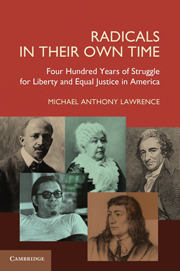Book contents
- Frontmatter
- Contents
- Illustrations
- Acknowledgments
- Introduction
- 1 Roger Williams (1603–1683): Freeborn
- 2 Thomas Paine (1737–1809): Revolution
- 3 Elizabeth Cady Stanton (1815–1902): Gender Wars
- 4 W. E. B. Du Bois (1868–1963): American Apartheid
- 5 Vine Deloria Jr. (1933–2005): Betrayals and Bridges
- Notes
- Index
1 - Roger Williams (1603–1683): Freeborn
Published online by Cambridge University Press: 05 June 2012
- Frontmatter
- Contents
- Illustrations
- Acknowledgments
- Introduction
- 1 Roger Williams (1603–1683): Freeborn
- 2 Thomas Paine (1737–1809): Revolution
- 3 Elizabeth Cady Stanton (1815–1902): Gender Wars
- 4 W. E. B. Du Bois (1868–1963): American Apartheid
- 5 Vine Deloria Jr. (1933–2005): Betrayals and Bridges
- Notes
- Index
Summary
I plead for impartiality and equal freedom, peace and safety to other consciences and assemblies, unto which the people may as freely go, and this according to each conscience.
– Roger Williams, 1652The Old World
The thirty-two-year-old man, very ill, stood on October 8, 1635, before the General Court of the Massachusetts Bay Colony, considering how to respond to the court's questions about his role in writing two letters bitterly critical of civil authorities for interfering with church matters. The court was prepared to offer one last chance at leniency.
“Do you wish for the court to postpone action for a month for further conference or disputation?” Governor John Haynes asked the man standing, Roger Williams, a minister with the Salem congregation.
Williams, who had cultivated a devoted following during his two years at the Salem church, was a family man, with a two-year-old daughter and a wife expecting their second child within the month, so he had every reason to hope for a light sentence.
“No, I do not,” Williams answered.
“Very well, then. Mr. Hooker will debate the issues for the court,” Haynes replied with some wonderment.
The Boston minister Thomas Hooker then attempted to “reduce him from his errors,” but Williams – who had been called before the Bay Colony authorities on numerous prior occasions to answer for his troubling views – was unrepentant.
- Type
- Chapter
- Information
- Radicals in their Own TimeFour Hundred Years of Struggle for Liberty and Equal Justice in America, pp. 15 - 67Publisher: Cambridge University PressPrint publication year: 2010



